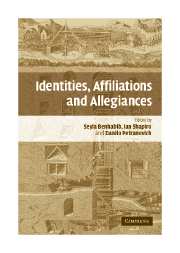Book contents
- Frontmatter
- Contents
- List of figures
- List of tables
- List of contributors
- Editors' introduction
- Part I Emergence and limits of national political identities
- Part II Multiple identities in practice: the European example
- 5 Building European institutions: beyond strong ties and weak commitments
- 6 Soft borders and transnational citizens
- 7 Transnational nationalism: redefining nation and territory
- Part III Decoupling citizenship from identity
- Part IV Identity and historical injustice
- References
- Index
6 - Soft borders and transnational citizens
Published online by Cambridge University Press: 05 June 2012
- Frontmatter
- Contents
- List of figures
- List of tables
- List of contributors
- Editors' introduction
- Part I Emergence and limits of national political identities
- Part II Multiple identities in practice: the European example
- 5 Building European institutions: beyond strong ties and weak commitments
- 6 Soft borders and transnational citizens
- 7 Transnational nationalism: redefining nation and territory
- Part III Decoupling citizenship from identity
- Part IV Identity and historical injustice
- References
- Index
Summary
This chapter considers possible ways in which to facilitate legal border crossings and cross-border polities as a democratic practice that respects ethno-national identities but does not recognize them as relevant criteria for the allocation and enjoyment of public goods. The argument proceeds from three assumptions: that identities are fluid and overlapping and, often, externally imposed; that a critical function of government is the provision of public goods; and that allegiances to different polities do not require long shared histories or strong cultural ties. Building upon these assumptions I suggest that borders can be softened by recognizing allegiances to overlapping polities, including those that stretch across the boundaries of existing nation-states, and by facilitating different kinds of participation based on functional interdependencies, intersecting interests, and multiple attachments.
Starting points: fluid identities, public goods, and multiple allegiances
Fluid identities
A significant literature has emerged in the last ten–fifteen years on identity politics, including theories of multiculturalism, recognition, and representation; analyses of nationalisms and self-determination; and subaltern, postcolonial, and feminist studies. While these diverse explorations into notions of identity have enriched studies in democratic theory in the name of difference, some works have merely facilitated another mechanism for fixing and naturalizing differences, and, accordingly, domination.
The particular strength of many feminist theories is that they take a critical stance with respect to the politics of national identity in pointing out the ways in which nation-building imagery and narratives naturalize national character through gendered metaphors, myths, and relationships.
- Type
- Chapter
- Information
- Identities, Affiliations, and Allegiances , pp. 136 - 158Publisher: Cambridge University PressPrint publication year: 2007
- 4
- Cited by

